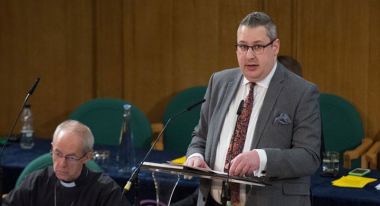The bishops' concerning treatment of Sam Margrave

The behaviour of senior bishops towards General Synod member Sam Margrave raises serious questions about the future for outspoken orthodox Christians in the Church of England.
Mr Margrave, a lay member for Coventry Diocese of the CofE's parliament, which met this week in Westminster, played a prominent role in Wednesday's five-hour debate on the bishops' proposal, accepted by the Synod on Thursday, to introduce services of blessing for same-sex couples.
He moved several amendments which were rejected by Synod. One of them aimed to reaffirm that "marriage is a union permanent and lifelong of one man with one woman" and that "sexual intercourse as an expression of faithful intimacy belongs within marriage exclusively".
The week before Synod, the Archbishops of Canterbury and York, Justin Welby and Stephen Cottrell, wrote jointly to Mr Margrave rebuking him for comments he had made on Twitter against LGBT Pride. The letter came after it emerged that the Bishop of Coventry, Christopher Cocksworth, had reported Mr Margrave to West Midlands police for his criticisms of Pride and Queer Theory.
According to Christian Concern, which is supporting Mr Margrave, "Queer Theory emerged in the 1970s and was prefigured by the revolutionary anti-family Marxism of the Gay Liberation Front (GLF). The GLF pushed the sexualisation of children as part of its case for banning therapy for homosexuality, and attacking the traditional family. The GLF specifically targeted Christianity and Judaism with the idea of 'smashing heteronormativity' – the view that relationships should be between a man and a woman. Gayle Rubin, an influential founder of Queer Theory, also believed paedophilia was a sexual orientation."
In a written question published before Synod, Mr Margrave had asked the Bishop of London, Sarah Mullally, if the House of Bishops had considered whether support for the Pride movement was compatible with biblical teaching. "If not, will it undertake to issue a view on this subject?" he asked.
In a supplementary question to Bishop Mullally on Tuesday, Mr Margrave asked what the bishops were doing to protect children from "sexualisation and grooming" at some Pride events and from Queer Theory. The Chair ruled his question out of order, claiming that it did not relate to his written question.
Mr Margrave said: "It's about the bishops' position on Pride, Chair, and whether they are protecting children from Pride. They should have a position and be able to tell me."
It was not clear precisely whom he was addressing in his next comment but it seemed to be directed at the bishops generally: "Because you don't want to protect children and you dare not speak against Pride or Queer Theory. Shame on you."
In Wednesday's Synod debate, the Bishop of Leicester, Martyn Snow, attacked Mr Margrave over the manner of his campaigning for the Church's traditional teaching on marriage and sexual morality. Bishop Snow said he held to "a traditional view of marriage" and therefore was "broadly in support" of Mr Margrave's attempt to preserve the CofE's "current view of marriage".
"However," he said, "I cannot condone for a moment the way in which Mr Margrave is seeking to achieve this aim both here in Synod and more broadly in terms of his media campaign. I understand that Mr Margrave attends a church in my diocese."
Mr Margrave then raised a point of order in which he said that, according to Synod standing orders, members must be given notice if they are going to be mentioned in a debate. He pointed out that he had received no such notice from Bishop Snow. After the Chair asked the bishop whether he was going to refer to Mr Margrave again, he withdrew his comments and accepted a ruling to proceed "without referring to individuals".
Bishop Snow continued: "I do, however, need it to be known that untold hurt has been caused to LGBT+ people in my diocese and therefore as chief shepherd of the Diocese of Leicester I cannot stay silent while people are hurt in this way."
Yet so far, Mr Margrave has been reported to the police by the bishop of the diocese he represents on Synod - it is noteworthy that the police concluded no further action needed to be taken; rebuked by the two Archbishops; and attacked in a Synod debate by the bishop of the diocese where he attends church over his campaigning manner.
In the light of Mr Margrave's treatment, the question must be asked: would an LGBT campaigner in the Church of England ever be subjected to such public episcopal censure over their trenchant communications and social-media accusations of "bigotry", "homophobia" and "transphobia" against orthodox Christians?
Julian Mann is a former Church of England vicar, now an evangelical journalist based in Lancashire.











